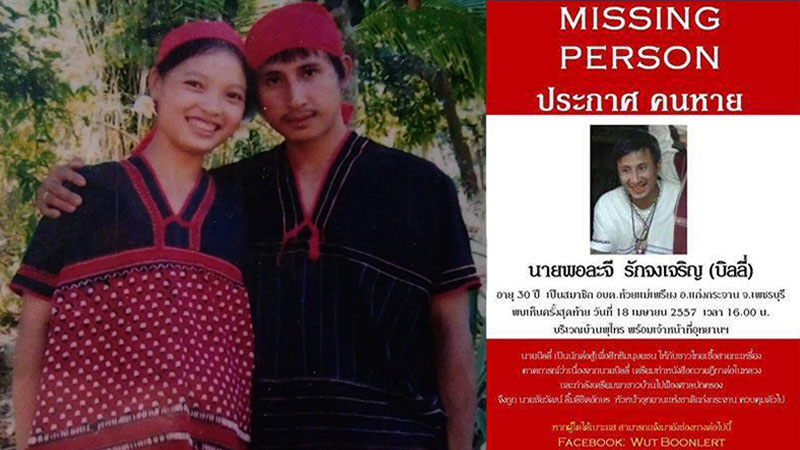Porlajee Rakchongcharoen, a prominent Karen rights activist in Thailand’s Petchburi province, disappeared on April 17, 2014. Four years later, Thailand’s Department of Special Investigations (DSI) is saying they’re ready to do something about it.
DSI director Pol. Col. Paisit Wongmueng yesterday announced his agency was reopening the case on Porlajee, who also went by “Billy,” a move human rights groups worldwide have been calling for years and which has long been a subject of national debate.
A solid timeline for the day of Billy’s disappearance has never been established, though he reportedly left his village to meet with Karen villagers — whose claimed their homes had been burned down by park officials — and activists at Kaeng Krachan National Park at about 10am.
By 2pm, rumors of his arrest had begun spreading around Phetchaburi. It wasn’t until 6am the next day that his family confirmed Billy had never come home. Two hours later, an informal search by the community had begun, and a missing persons report was finally filed with police at 8pm that night.
Billy was last seen being arrested by then-Kaeng Krachan National Park Superintendent Chaiwat Limlikitaksorn and his team for allegedly taking wild bee honeycomb from a restricted area, according to Spring News.
Traces of human blood were found in one of the park’s cars, but the vehicle was allegedly cleaned before forensics could examine and identify it.
While being investigated by Police Region 7, park officers admitted to arresting Billy but insisted they had simply released him after a brief questioning. In September 2014, however, malfeasance charges were filed against Chaiwat and the four park officers involved after no records relating to Billy’s release from custody could be found.
In a separate case that came to a conclusion earlier this month, Chaiwat was found guilty of burning and destroying hundreds of Karen houses. The Supreme Administrative Court ordered him to compensate the six plaintiffs a combined THB301,737 (US$9,143).
Kingsley Abbot, Bangkok-based senior legal adviser for the International Commission of Jurists tweeted yesterday that he hoped the reopening of the case might signal “an important step towards accountability and establishing the truth about [Billy’s] fate or whereabouts.”
On April 17, the four-year anniversary of Porlajee’s disappearance, Cynthia Veliko, regional representative of the UN human rights office said she believed the 2014 disappearance “served to create a climate of fear and to underscore the risk for other human rights defenders, particularly those working on land and community rights as well as those defending the rights of indigenous peoples across the country” — something a nation shouldn’t let slide.




